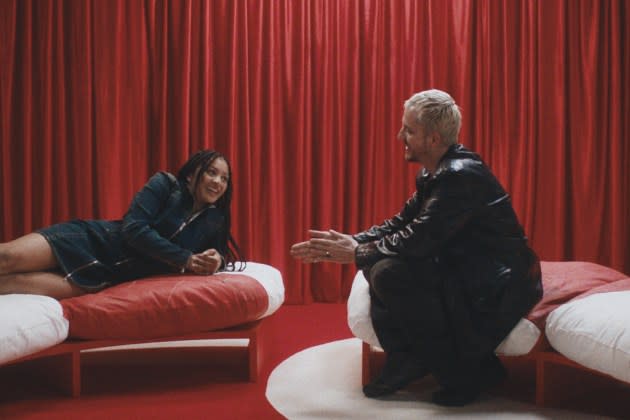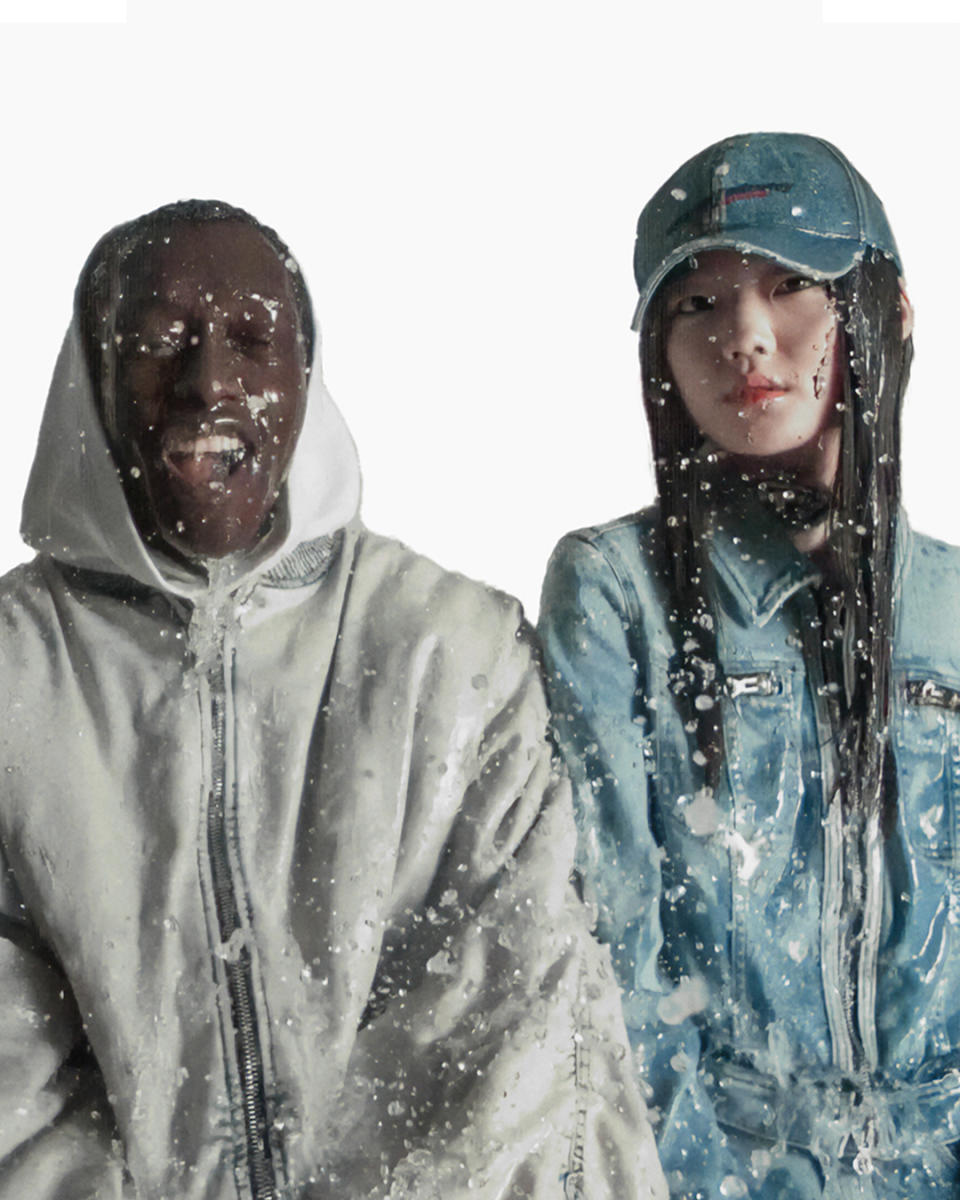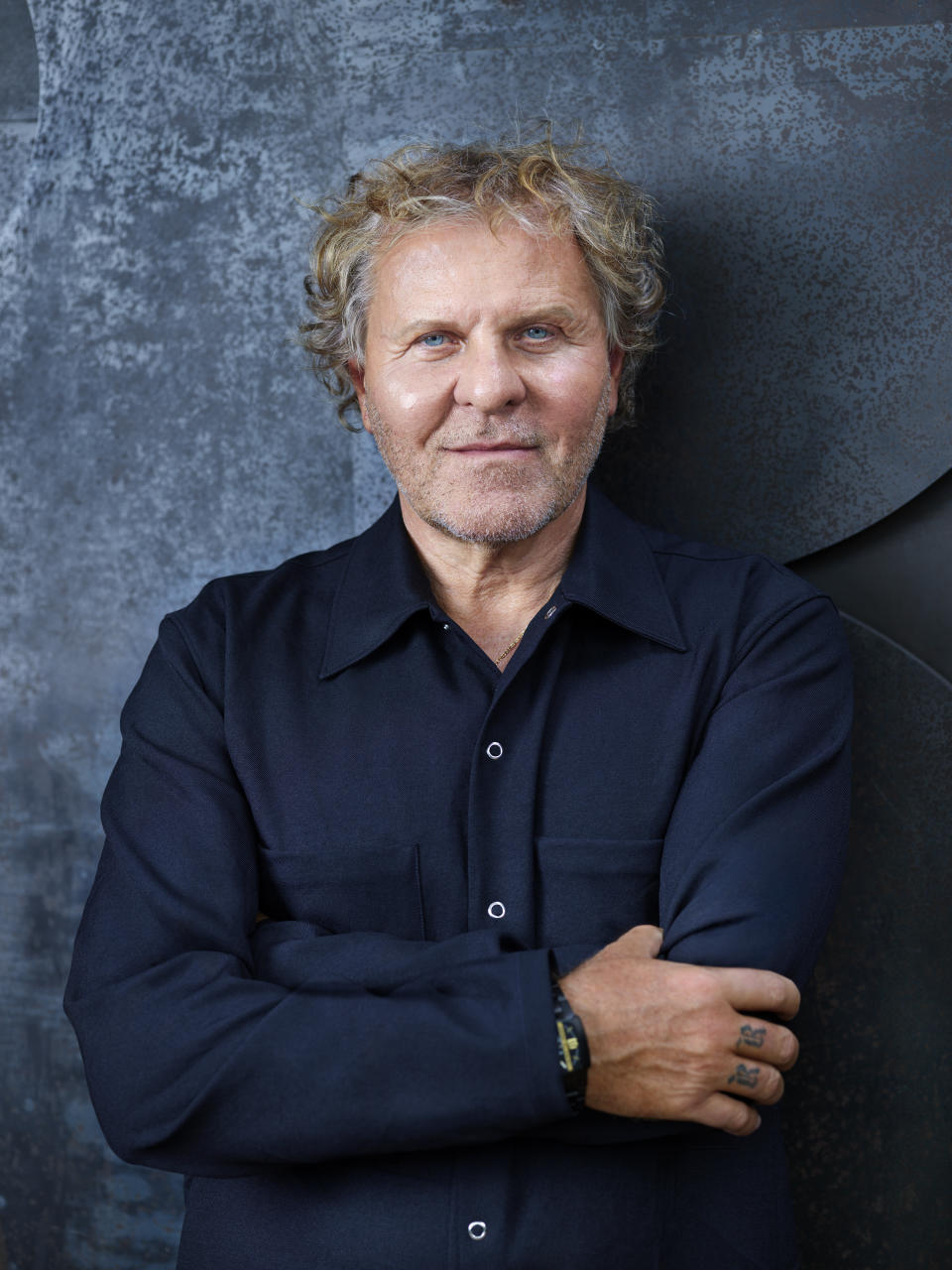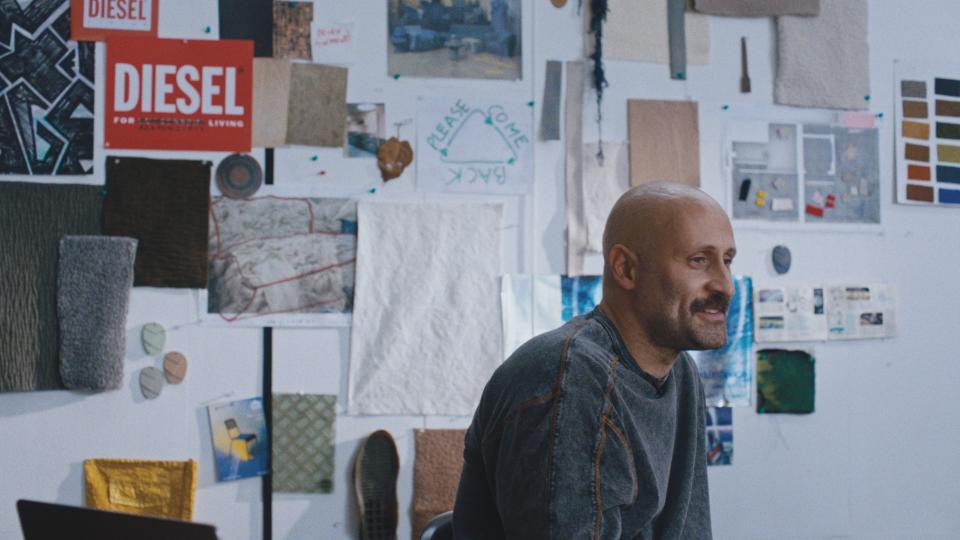EXCLUSIVE: Why Diesel Believes Sustainability Doesn’t Have to Be Boring, Launches Documentary on Denim
- Oops!Something went wrong.Please try again later.
- Oops!Something went wrong.Please try again later.

MILAN — Aiming to add a dose of pizzazz to the issue of sustainability, Diesel is launching a five-part mini-documentary series, in sync with the brand’s fun and irreverent style.
Called “Behind the Denim,” each episode will take a close look at the life cycle of denim from farm to factory to the customer’s closet, underscoring the brand’s commitment to creating lower-impact denim.
More from WWD
The Met Reveals Multisensory Details About 'Sleeping Beauties' Exhibition
Marni's Francesco Risso Talks Working in a 'Cave,' Students' Limitlessness and Pratt Honor
“Talking about sustainability at times can be boring,” admitted Diesel’s creative director Glenn Martens in an exclusive interview with the brand’s founder Renzo Rosso and his son Andrea, the brand’s sustainability ambassador.
Martens has been as much a driving force in developing Diesel’s sustainability strategies as the Rossos. “Glenn is very sensitive to this issue and is very knowledgeable, always striving for more sustainable garments, and he doesn’t settle for anything in the middle, it’s all or nothing,” observed Andrea Rosso. Speaking of the documentary, he said the idea has been in the works for years, “but we wanted to say something in Diesel style, still rigorous but avoid being tedious.”
His father is equally driven and committed and since the launch of “For Responsible Living Strategy,” Diesel’s denim program has been completely overhauled to implement less impactful practices across the supply chain, from fabrics to treatments. For example, Diesel’s denim crafted from organic, recycled or regenerative cotton has in the last three years grown to 50 percent from 3 percent.
“I was born in a farm and I received certain values as a child, the principles of respect, of helping people, giving back and sharing what is in excess,” said Renzo Rosso. “Sustainability must be, first of all, a state of mind. The values that were passed on from my family, I share daily with the 7,000 people that work with me in OTB, committed to the strategy ‘Be Responsible, Be Brave,’ across all brands and companies of the group.”
OTB released its third sustainability report on Monday, Earth Day, “which drives us to objectives that are increasingly more ambitious in order to actively contribute to the transition to a more responsible industry,” said the founder of Diesel. Like his son, he underscored that it was key to avoid greenwashing and empty “claims.”
Hosted by Lea Ogunlami of I-D, each episode of the “Behind the Denim” series is dedicated to a pillar of Diesel’s denim practice — All Aboard, Lifetime Jeans, Clean Dirty, Sow the Seed and Waste to Treasure — with interviews with Martens, Andrea Rosso and OTB Group chief sustainability officer Sara Betteghella.
Ogunlami doesn’t shy away from asking tough questions without betraying Diesel’s humorous attitude. “Is sustainability sexy? What is a sustainability ambassador? Does anyone know what ‘circularity’ actually means?” are some examples.
“Behind the Denim” was produced in partnership with Create Sustain and directed by Luke Casey, who has worked with the likes of Calvin Klein, Vans, Mulberry and Helmut Lang, and will be released on Diesel’s social channels and on its online platform, an episode each month until November, with a pause in July and August.

Ogunlami talked to Diesel denim customers shopping at the brand’s flagship in Milan’s San Babila area, and visited one of the industrial denim laundries that works with the brand to see how Diesel’s washes are executed using innovative techniques aimed at reducing the use of water and chemicals. She traveled to a regenerative cotton farm in Spain and to a warehouse filled with denim scraps with fabric sustainability specialist Tejidos Royo to see how Diesel’s Rehab Denim is crafted with recycled materials and Diesel’s own denim, reducing waste.
Asked about finding a balance between creativity and sustainability, Martens admitted that there are a few limited items that “are on the runway for the artistry and the dream and don’t have a massive impact and are sort of the cherry on the cake, for the sake of beauty — I also need these moments.”
Sustainability also drives creativity, as he remarked that working with recycled denim means that the yarn gets shorter and less rigid, so you have to design according to that yarn. It also leads to seeking new technical solutions, which can then be “taken over by other companies” and prices will start decreasing, but experimenting takes time. He proudly said Diesel has over two years developed the first fully recycled denim.
“For me it’s very important to always insist and repeat your message because in a company with thousands of employees, people change and it can be easily forgotten.”

Martens said Diesel’s “massive reach” was a key component in choosing to work with the Italian brand.
“It doesn’t matter which background you have, which family you’re born in[to], which sexuality or where you live in the world, everybody’s kind of Diesel, it’s really a very global brand.”
This was one of his motivations to join the brand. “Fashion is great, fantastic and it’s all about making beautiful clothes to make people feel empowered and feel good. But obviously, we also know that fashion is very polluting, especially denim, and we also know that fashion has a massive social impact, because many, many people follow. So it comes with a responsibility also to give good messages because you actually can be part of the process of awareness,” said the designer, who was named to the top creative post of Diesel in the fall of 2020. “I’m not saying that we can do it all by ourselves, it’s together with all the other companies in the world, all the other institutions in the world. But at Diesel, we have such a big reach, we actually can speed up the process of awareness.”
Martens recalled that when he joined Diesel, he made a “massive manifesto, which was all focused on social sustainability and environmental sustainability,” with a guideline of “really putting fuel or diesel in the machine of environmental sustainability,” he said, laughing at the pun. “And that is why I’m very, very proud of all my teams really, really proud.”
Andrea Rosso said two main objectives of Diesel are to “use less water and chemicals. We are increasingly working on innovating our treatments and the technology requires a lot of time to implement the changes and for the trademarks and it can take years to pass the regulations. In any case, it’s important to spread the message and raise the bar, accelerating research and development, based on rigorous criteria.” Sustainable practices extend to the displays; visual merchandising, through the use of discarded materials, for example, and the supply chain.
Renzo Rosso underscored that “it is a very difficult task — almost impossible — to certify the pipeline from the raw material to the final product, and it’s expensive,” but that is not stopping OTB, which in addition to Diesel also controls the Marni, Jil Sander and Maison Margiela companies, among others, from stepping up its efforts. Over the years, it has joined the Aura Blockchain Consortium as a founding member, the Fashion Pact, and the Camera della Moda Re.Crea to manage the end-of-life cycle of products, and favor recycle solutions.
“I am convinced we have to collaborate with the industry and other companies to really make a difference,” he said, adding that 800,000 OTB products have been registered on the Aura Blockchain Consortium platform. “My idea is to produce less but with more quality,” he said.
The C.A.S.H. program, launched in 2013, guarantees OTB suppliers easier and speedier access to credit across the pipeline. The OTB Foundation, which was formed in 2006, has helped more than 350,000 people through 350 projects.
In his signature energetic way, he listed several initiatives, from free breast-screening tests for all employees to offering kindergarten and training services. He said he was very proud of the fact that women represent 54 percent of the OTB Group’s management.
Energy from renewable sources in internal operations stands at 56 percent globally, and more than 99 percent in Europe.

Martens said he was aware that many people “don’t have the luxury to think so much about sustainability because they have 75 things to do in one day” — citing his brother, a fireman, for example — but that after all their daily chores, they may see that there is actually a sustainable message within that product they bought and “that we are flagging something that maybe they don’t have the time to think about. And that will help the process of awareness. We have so many chapters that we are targeting, but I think that was a good moment to speak about our journey but in that fun way.”
Martens concluded by saying that “you have to pick your battles and I am always into full discussion with the whole teams, deciding what from now on will be the category, or the order or the chapter which is for now and forever going to be sustainable, because you cannot change the whole company and these things also come with price changes.”
Swimwear is all made from recycled or other lower-impact materials, Diesel Essential jerseys for the last few seasons have all been made using organic cotton and now 50 percent of the denim collection features lower-impact materials such as organic, recycled or regenerative cotton.
Best of WWD

